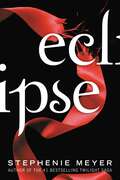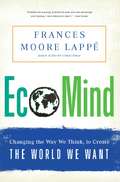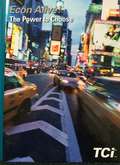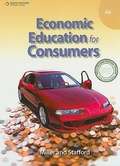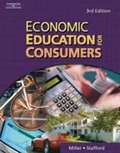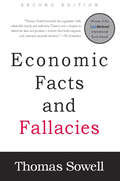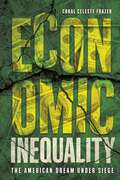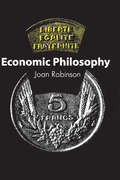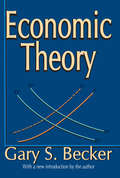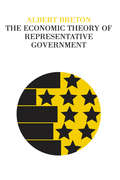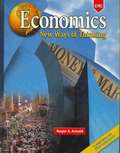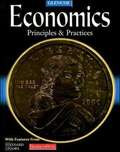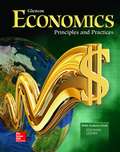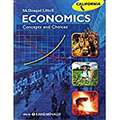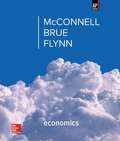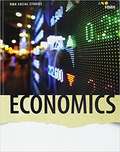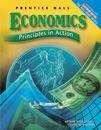- Table View
- List View
Eclipse: Eclipse Vol. 1 Of 2 (The Twilight Saga #3)
by Stephenie MeyerReaders captivated by Twilight and New Moon will eagerly devour Eclipse, the much anticipated third book in Stephenie Meyer's riveting vampire love saga. As Seattle is ravaged by a string of mysterious killings and a malicious vampire continues her quest for revenge, Bella once again finds herself surrounded by danger. In the midst of it all, she is forced to choose between her love for Edward and her friendship with Jacob --- knowing that her decision has the potential to ignite the ageless struggle between vampire and werewolf. With her graduation quickly approaching, Bella has one more decision to make: life or death. But which is which?
EcoMind: Changing the Way We Think, to Create the World We Want
by Frances Moore LappeIn Eco Mind, Frances Moore Lappé-a giant of the environmental movement-confronts accepted wisdom of environmentalism. Drawing on the latest research from anthropology to neuroscience and her own field experience, she argues that the biggest challenge to human survival isn’t our fossil fuel dependency, melting glaciers, or other calamities. Rather, it’s our faulty way of thinking about these environmental crises that robs us of power. Lappé dismantles seven common "thought traps”-from limits to growth to the failings of democracy- that belie what we now know about nature, including our own, and offers contrasting "thought leaps” that reveal our hidden power. Like her Diet for a Small Planet classic, Eco Mind is challenging, controversial and empowering.
Economic Education for Consumers
by Roger Leroy Miller Alan D. StaffordECONOMIC EDUCATION FOR CONSUMERS, 4E brings economic, consumer, and personal finance topics to life. Exciting changes to this edition include a bright, new design and updated information on important changes in technology, banking, and taxes. Organized into several class-length lessons, each chapter contains several features to capture and maintain student interest, such as Consumer Alert, Vote Your Wallet, Inside the Numbers, Math of Money, What in the World?, and NetBookmark.
Economic Education for Consumers
by Roger Leroy Miller Alan D. StaffordThis textbook helps high school students to become informed consumers and prepares them to make wise financial decisions. Sample topics include choosing a career, filing taxes, budgeting expenses, using credit, and investing for the future. Among the pedagogical features is a capstone project in which students incorporate course material into a comprehensive lifespan plan for achieving their personal goals. Annotation ©2006 Book News, Inc. , Portland, OR (booknews. com)
Economic Facts and Fallacies: Second Edition
by Thomas SowellEconomic Facts and Fallaciesexposes some of the most popular fallacies about economic issues-and does so in a lively manner and without requiring any prior knowledge of economics by the reader. These include many beliefs widely disseminated in the media and by politicians, such as mistaken ideas about urban problems, income differences, male-female economic differences, as well as economics fallacies about academia, about race, and about Third World countries. One of the themes ofEconomic Facts and Fallaciesis that fallacies are not simply crazy ideas but in fact have a certain plausibility that gives them their staying power-and makes careful examination of their flaws both necessary and important, as well as sometimes humorous. Written in the easy-to-follow style of the author’sBasic Economics, this latest book is able to go into greater depth, with real world examples, on specific issues.
Economic Inequality: The American Dream under Siege
by Coral Celeste FrazerMillions of Americans don't earn enough money to pay for decent housing, food, health care, and education. Increasingly, families and young people aren't doing better than their parents and grandparents before them. In fact, they're doing worse. And women and minorities earn less than white men. The American Dream is harder to achieve than ever before. Meanwhile, the rich keep getting richer. Many Americans are angry about economic inequality, and many are working on solutions. Readers will learn how state and local governments, businesses, and ordinary citizens—including young people—are fighting to close the gap between rich and poor, to preserve the promises of American democracy, and to give everyone a fair shot at the American Dream.
Economic Philosophy (Pelican Ser.)
by Joan Robinson"Economics has always been partly a vehicle" for the ruling ideology of each period as well as partly a method of scientific investigation. It limps along with one foot in untested hypotheses and the other in untestable slogans. Here our task is to sort out as best we may this mixture of ideology and science."With these provocative words, Joan Robinson introduces this lively and iconoclastic book. "In what follows," she says, "this theme is illustrated by reference to one or two of the leading ideas of the economists from Adam Smith onwards, not in a learned manner, tracing the development of thought, nor historically, to show how ideas arose out of the problems of each age, but rather an attempt to puzzle out the mysterious way that metaphysical propositions, without any logical content, can yet be a powerful influence on thought and action."Robinson is responsible for some of the most austerely professional contributions to economic theory, but here in effect she takes the reader behind the scenes and cheerfully exposes the dogmatic content of economic orthodoxy. In its place, she offers the possibility that with obsolete metaphysics cleared out of the way economics can make a substantial advance toward science. .
Economic Theory
by Gary S BeckerOthers might have called this book Micro Theory or Price Theory. Becker's choice of Economic Theory as the title for his book reflects his deep belief that there is only one kind of economic theory, not separate theories for micro problems, macro problems, non-market decisions, and so on. Indeed, as he notes, the most promising development in recent years in the literature on large scale economic problems such as unemployment has been the increasing reliance on utility maximization, a concept generally identified with microeconomics. Microeconomics is the subject matter of this volume, but it is emphatically not confined to microeconomics in the literal sense of micro units like firms or households. Becker's main interest is in market behavior of aggregations of firms and households. Although important inferences are drawn about individual firms and households, the author tries to understand aggregate responses to changes in basic economic parameters like tax rates, tariff schedules, technology, or antitrust provisions. His discussion is related to the market sector in industrialized economies, but the principles developed are applied to other sectors and different kinds of choices. Becker argues that economic analysis is essential to understand much of the behavior traditionally studied by sociologists, anthropologists, and other social scientists. The broad definition of economics in terms of scarce means and competing ends is taken seriously and should be a source of pride to economists since it provides insights into a wide variety of problems. Practically all statements proved mathematically are also provided geometrically or verbally in the body of the text.
The Economic Theory of Representative Government
by Albert BretonThis book provides a theory capable of explaining the patterns of public expenditures and taxation that occur under representative government. Economists and political scientists have come to realize that issues of public policy and public finance cannot be solved on the naive assumption that these are problems tackled by a government that exists only to serve the public good. Instead, government must be understood as one of the major economic institutions of society, one that behaves like more familiar economic institutions--the household and the firm--though the market it confronts is a market for policies rather than for goods and services. Albert Breton's pathbreaking work remains important in taking us toward a theory of representative government that enables an understanding of the observed behavior of political institutions.The author's analysis is cast in a relatively simple demand, supply and demand-supply-equilibrium framework, using the tools of marginal and stability analysis to explain the forces that influence and determine the flow of resources as they are allocated between competing ends in the public sector. The book presents a model of demand by citizens, who are assumed to be maximizing their desires for specific public policies and private goods, and a model of the supply of public policies by politicians and bureaucrats, who are assumed to be maximizing the probability of their re-election and the size of their budgets. Breton defines government policies and the institutional framework for collective choices in terms that render them amenable to further analysis.The main accomplishment of Breton's theory is that it provides the ability to analyze the interaction of individuals and generates testable propositions about the behavior of these individuals as well as about the behavior of public expenditures and taxation in more aggregative terms. In this way the book will be useful to students of economics, economists, and those interested in economic theory.
Economics: Institutions and Analysis Fourth Edition
by Gerson Antell Walter HarrisThis text book keeps it simple. It's organized intelligently and it has an extended glossary with concise definitions of virtually every term mentioned in the text. So while economics is never easy to grasp, this book is written in such a straight-forward way, it makes it clearer than most economics text books.
Economics: It's Your Business
by Henry BillingsLearn about the meaning of economics, what affects it, its systems and the world's view about it.
Economics: Principles and Practices
by Gary E. ClaytonThis book contains topics on Fundamental Economic Concepts, Micro Economics, Macro Economics (Institutions, Policies), International and Global Economics. Profiles in Economics, Economics in Action (Video Activities), Interactive Economics (Computer Activities), Surfing the Net (Web Activities), Technology Activities, Skills (Economic, Critical Thinking, Technology and Life). Also included are Charts, Maps and Graphs.
Economics: Principles And Practices
by McGraw-Hill EducationProven in the classroom, Economics: Principles and Practices provides a solid basis for learning economics for all students based on the twenty standards from the Council of Economic Education Includes Print Student Edition
Economics: Work and Prosperity in the Christian Perspective (Second Edition)
by Russell Kirk Julie LostrohOffers a view of economics from the standpoint of Biblical authority.
Economics: Principles, Problems and Policies AP edition
by Campbell R. Mcconnell Stanley L. Brue Sean M. FlynnAP Economics textbook
Economics: Concepts and Choices Test Practice and Review Workbook
by Mcdougal-Littell Publishing StaffNIMAC-sourced textbook
Economics: Student Edition 2018 (Hmh Social Studies Economics Ser.)
by Sally Meek John Morton Mark C. SchugNIMAC-sourced textbook
Economics: Principles in Action
by Arthur O’sullivan Steven M. SheffrinEconomics: Principles in Action is a multi-dimensional program designed to help students of all abilities achieve fundamental understanding of core economic principles. Key concepts, based on the twenty content standards of the National Council on Economic Education (NCEE), are developed throughout the program and supported by a variety of activities to help students apply their new knowledge to the real world.
